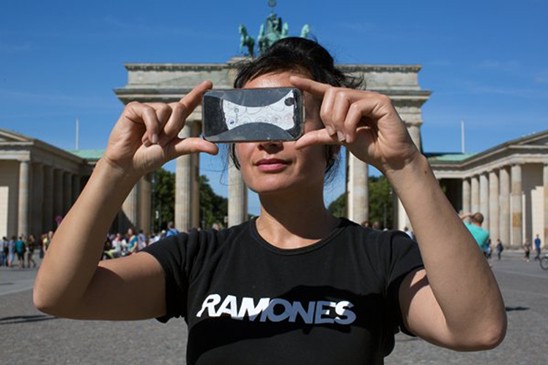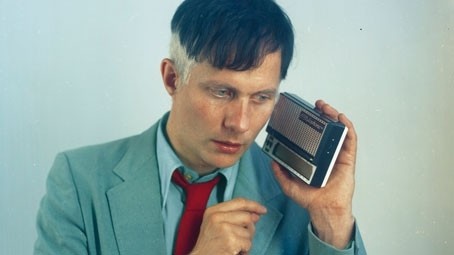
White text on black screen: This is a shot.
White text on black screen: This is a counter shot.
So starts Abstract, the latest short film from Hito Steyerl, opening the F for Fake programme. A woman stands in front of the Brandenburg Gate holding up an iPhone in the typical pose of a tourist photographer, though she seems to be facing the wrong way. This is a shot. Then we are in a Kurdistan desert, being shown around rubble, by a man picking up rags and describing the clothes they once were. This is a countershot.
Drawing connections between the military subject and the film’s own composition – ‘The grammar of cinema follows the grammar of battle’ – Steyerl defines the abstraction between the makers of weaponry and the people that missiles hit. By making visible the grammar of the edits and then disrupting our own understanding, Abstract demands an active spectator, and builds up a tension that makes the film’s conclusion all the more shocking and resonant.
Abstract is the final part of a trilogy about Andrea Wolf, Steyerl’s teenage friend who was killed as a revolutionary in 1998. November and Lovely Andrea, were last screened in London as part of the Club Des Femmes Pussy Riot fundraiser, and taken together, they perform the extraordinary feats of awakening the possibilities of cinema as a political weapon and forming a moving monument to a woman’s life.

Following his striking performance in Nicolas Provost’s The Invader, Issaka Sawadogo returns as the anchor in Frdrick Pelletier’s feature film drama Diego Star.
Solidarity breaks down at the docks when an accident exposes how creaky a cargo ship is, and its crew are marooned in a Canadian Saint Lawrence River port. Second engineer Traor (Sawadogo) is housed with tough single mum Fanny (played with requisite grit by ex-mechanic Chlo Bourgeois) while an investigation takes place.
She is trying to get along in a place where options don’t exist and he is determined to keep his integrity while his shipmates lose their heads. As trust grows between the pair, Pelletier inserts a financial transaction between each of his characters and their consciences, effectively illustrating the pressures of big business on the daily lives of the working classes.
As a morally sharp dose of social realism it strikes a cool tone, becoming all the more emotionally wrenching as things fall to pieces. A contender for the festival’s new Big Screen Award, it is a further example of the strength of contemporary Quebecois cinema, and wins much admiration by not chickening out at the last.

Figs proved a two-part highlight in the Tiger Awards Competition for Short Films 4 programme. Firstly, the film itself is a simple story of a gay relationship, told in voiceover, from the first intimacy to the bitter conclusion. On screen we see two men wrestle, take a shower and hang out together, and there is something so light and effortless to the proceedings that it is really charming and true. The type of film you want to rush out and programme, it is likely to have a strong festival life.
The second-part came in the deadpan Q&A where first-time Swedish director Tony Cederteg revealed that the onscreen couple (one of whom is his real-life boss) met for the first time 30 minutes before the shower scene, and still don’t know what the film is about. When asked how he coaxed such natural and intimate performances, he shrugged, “In Sweden we like to wrestle.” Explaining the film’s origins Cederteg placed it as a reaction against mainstream representation based on images of marches and parades, “They are always seen dancing on caravans,” he said, “but all the gays I know would like to stay home and watch movies.”

Crunching through the deep snow across the Erasmus bridge with Helen DeWitt, – is now the time for me to mention that Yaktrax are the world’s greatest inclement weather invention? I’m going to open a Rotterdam franchise next year – we are rewarded with sanctuary in the warm glow of Arminius church, for 2 Film Concerts – Ibragimova & Rudy with films by the Brothers Quay. As curator Erwin Carels explains, the films can only be shown in non-cinema venues, but where the projection is good, and they must have the musicians present to perform, as the films were made in service to the music, rather than the more common reversed relationship.
Unfortunately Alina Ibragimova, the first performer is unable to attend for family reasons, so as a replacement, we are treated to The Sandman, a rarely screened dance film from 2000. German Romantic author E.T.A. Hoffmann lies on his deathbed as a nurse and doctor tend to him, and a devil from one of his own stories plays tricks on those around him. It’s sumptuous gothic stuff, with added Adam Cooper, all fluid and magnetic in ways that dance is always hard to describe, but mostly a dark joy to behold.
I have not yet read my Kafka (which doesn’t stop me from being excited by the idea of a Soderbergh re-edit), but I suspect my sensibility is just not aligned, as the next film, a version of Metamorphosis, leaves me cold. Potato heads are in check, keyholes, insect and architecture askew, a suggestion that the screen could dissolve into cobwebs at any moment, all there. But whilst it would no doubt be a treat for morbid anatomy fans, and the live piano from Mikhail Rudy (as written by Leo Jancek) is quite spellbinding, my spirit leaves the room long before the closing credits.

Felix Kubin, however, is much more my sonic cup of tea, and his stopstart techno and offbeat balladry greeted us at WORM for another Mind The Gap event. Kubin, who played a storming set at the Star and Shadow Cinema for the 2010 AV Festival, has live visuals by animator Martha Colburn, and emanates a part evil professor / part electro evangelist stage presence, and is mostly just lots of fun to dance to.
Now that the late nite has livened up I enjoy cigarettes with German filmmakers and catch up with Phil Collins, who is on this year’s Tiger Short Film Jury and has an excellent Ian McCulloch story, Omar Kholeif, who has co-curated two programmes of recent works from the Middle East at this year’s IFFR and is about to jump from FACT to new venture The White Building, and Flatpack Festival’s Assistant Programmer Sam Groves, with whom I share tips on videotheque viewing before riding the ice homeward once more…

